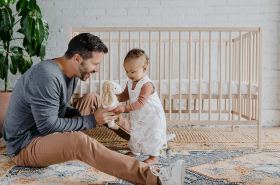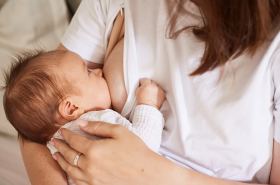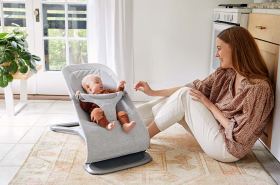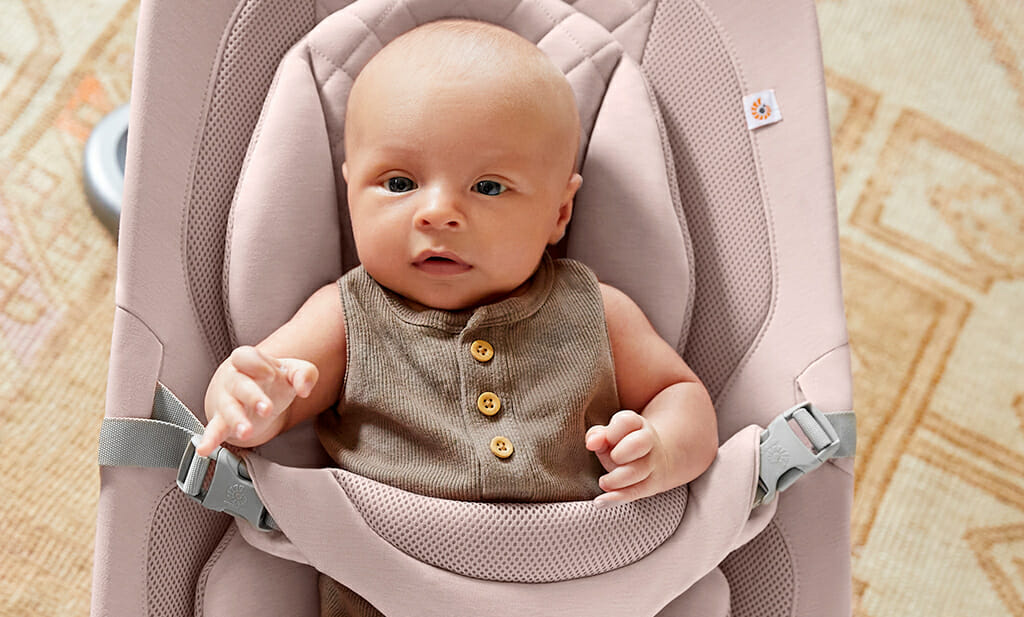
When researching for the best baby gear, you can hardly avoid the search term “baby bouncer” as it is a must have item on all the baby lists.
As there are so many baby bouncer options available, it can be confusing choosing the right one for your little one. The market is flooded with various designs, different functions and opposing opinions on how long to keep your baby in a bouncer for. It’s no wonder you may find this product category a little daunting.
When you need to get on with practical everyday tasks like taking a shower or loading the dishwasher, you need a safe, cosy place for your little one to rest when they can’t be in your arms.
But how do you choose the best bouncer for your baby when there is such a vast amount of choice in the market? Ergobaby would like to answer the most common myths surrounding baby bouncers to ease your mind and make your shopping experience a little easier.
Did you know that your baby develops more rapidly in the first few months of life, compared to any other time in the first year of their life. Investing in baby products that evolves with your little ones developmental stages from day one will make your money work harder.
The five most common myths about baby bouncers answered.
Myth #1: Using a baby bouncer can lead to incorrect posture for a child?
If you leave your baby in a bouncer for an extensive amount of time, their posture can be compromised. We follow the advice from the World Health Organization (WHO). WHO states not to let young children sit in the same position for more than one (1) hour. We therefore advise against allowing your baby to spend longer than one (1) hour in a bouncer throughout a day. Your child can sit in a baby bouncer several times during one day as long as you feel confident that they are getting ergonomic support from head to hips. We advise you to vary where your baby spends their time, in your arms, carried in a baby carrier, placed in a stroller, cot and a baby bouncer.
What does this mean for a child?
A newborn baby’s back has a slightly rounded spine that is not designed for lying on a flat surface. Babies are therefore more suited to being carried. However, when baby wearing is not practical, a well designed ergonomic baby bouncer can hold your little ones natural posture.
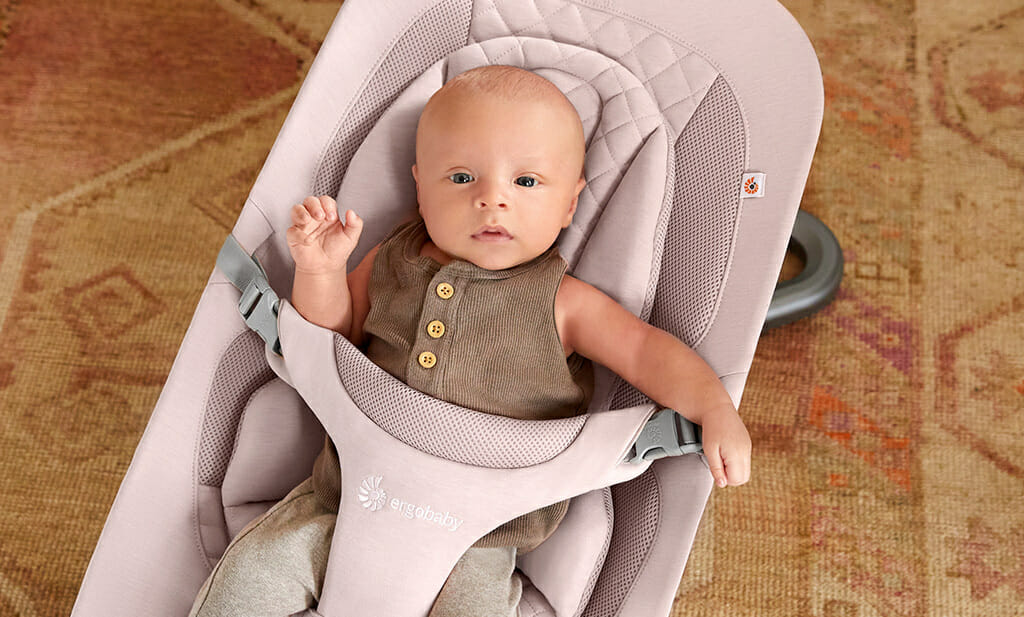
How to find an Ergonomic Position in Baby Bouncer.
When a newborn is sat in a bouncer seat, their pelvis moves into a physiological upright position. Their hip bone straightens up, their coccyx (small bone at the base of the spine) comes forward and an excessive curvature of the lumbar and cervical spine weakens. The thoracic spine (middle section of the spine) comes out of its excessive rounding.
For newborns, their pelvis should be stable when sat in the bouncer seat. Their body shouldn’t tilt forward or slump to the side. Trunk hyperextension and slumping should be avoided at the early stages of development.
When finding the correct position for your childs’ legs, look for a squat-splay posture, which naturally influences the correct spinal posture. Their legs should naturally be position in the air. If your baby has dangling legs when sat in a bouncer, this is a sign they are not sat in the most ergonomic position.
To allow your baby to stay in an optimal ergonomic position, look for a bouncer with a removeable ergonomic newborn insert and well-supported bouncer seat. When your little one becomes more agile and needs more space for movement, simply remove the newborn insert.
To support your baby’s developmental milestones through to toddlerhood, the inclined angle of a bouncers should adjust to meet your growing childs’ needs. For newborns, an ergonomic baby bouncer has an appropriate lying position. For toddlers, an upright position for sitting, reading and relaxing is more suitable.
Myth #2: You should not use a baby bouncer from birth, but only from around 3 months.
A baby bouncer is suitable from birth when used with an ergonomic newborn insert. The reclined seat is perfect for newborns who can’t yet support their head. It’s no surprise that many parents are choosing to baby bouncers as a place for their little ones to rest when they need some down time or their hands free. After all, what do you do when you need to go to the toilet, take a shower and eat dinner.
A baby bouncer is a practical helper in everyday life. A lightweight bouncer can be moved around your home with ease. And a bouncer that folds flat can be transported to friends and family homes, while providing a familiar place for your child to stay amused.
Myth #3: A baby bouncer can hinder breathing!
Midwife and babywearing expert Katrin Ritter has often heard statements like, “Newborn babies can’t hold themselves up yet and slump their tiny bodies into a bouncer, isn’t that dangerous?”
Your baby can only turn their head to the side up to a 45-degree angle in the first three months of life. Too many baby bouncers in the market offer too little space for your baby’s protruding occiput (back of the head).
As a result, baby presses their chin onto their chest. At the same time leads to a tilted position of the head and makes turning impossible. In the worst case, breathing can become restricted.
A well-designed baby bouncer will allow your baby’s head enough room to turn. This is achieved by a recess in a new born insert and less tension in the seat fabric of a bouncer in the lowest (lying) position. Combined with ergonomic support for the spine, pelvis and legs, you won’t have to worry about breathing.
Myth #4: A baby bouncer overstimulates and prevents physical closeness!
A baby bouncer is designed to encourage the baby’s self-regulation. Too many external stimulus can lead to your baby becoming overstimulated.
What is overstimulation? Overstimulation is a situation in which a child is experiencing more sensations, noises and input than they are able to handle. When a baby is experiencing this “overload”, negative emotions arise.
Cues that your baby is getting too much stimulation include:
- hiccupping
- yawning
- sneezing
- frowning
- looking away
- squirming
- frantic, disorganized activity
- arms and legs pushing away
- arms and legs limp and floppy
Investing in a ‘baby powered’ bouncer, your little one can self regulate by learning to rock the seat for themselves by moving their body.
There is no greater feeling than holding your baby in your arms, carrying them in a baby carrier or cuddling up together on the sofa. What can bring more joy than skin-to-skin contact between baby and parent/caregiver?
A baby bouncer is intended as a temporary everyday helper. it is not a permanent solution. If you want to have your hands free, you can of course use a baby carrier. However, as baby grows, the more they will gain their independence and develop motor skills.
Myth #5: A baby bouncer is dangerous and not back-friendly!
For a product that is used daily, safety and ergonomics should not be compromised. Choose a bouncer with a wide base and accessible foot pedal to adjust the bouncer’s reclining positions. This allows quick reclining adjustments without having to bend over, thus protecting your back. Select a bouncer with a safety harness with easy to release buckles so you can reach your baby quickly.
When you are setting up your new bouncer, remember to read the safety instructions.
Baby bouncers should always be used on flat surfaces at floor level. Do not place a bouncer on high counter tops, kitchen surfaces, dining tables or uneven surfaces.
never use a toy bar use as a handle to carry a bouncer from room to room. Place your bouncer within a room that is freely accessible from all sides. Make sure that the bouncer cannot collapse accidentally by reading carefully how to fold and lock the product in place. Never leave your child unattended when placed in a bouncer.
3-in-1 Evolve Bouncer. Designed to support your little one from day one.
The Ergobaby 3-in-1 Evolve bouncer was developed with a paediatric orthopaedic surgeon. It is the only baby bouncer to currently be awarded the Aktion Gesunder Rücken (AGR) seal of approval.
The Evolve 3 in 1 bouncer is suitable from birth (2.5 kg) to toddler age (13.2 kg) . Transforming from a cosy newborn lounger, to a relaxing infant bouncer, to a functional toddler chair.
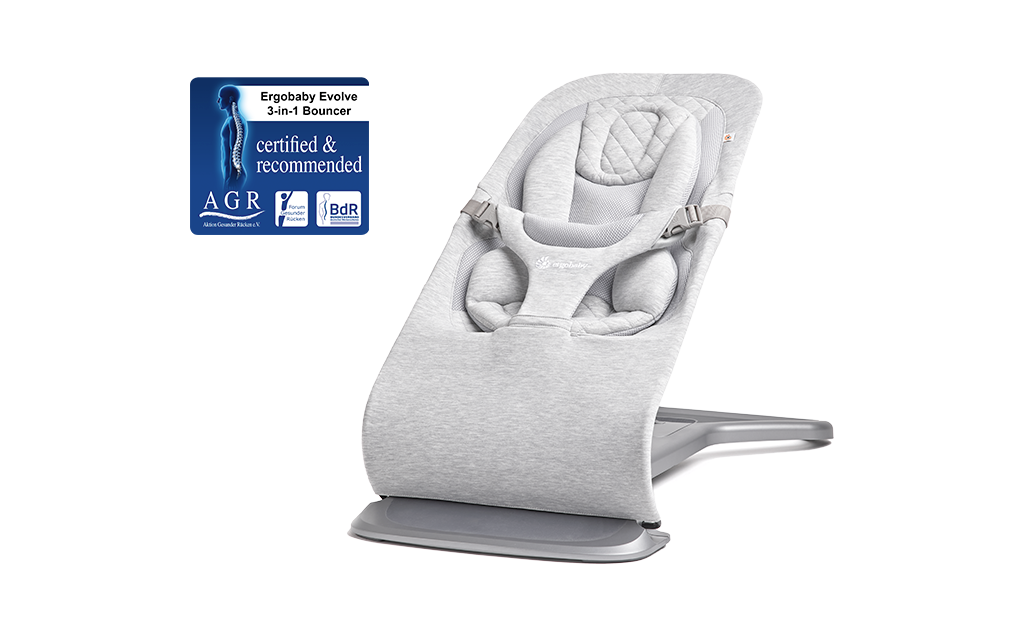
Click here to find more information about the Evolve Baby Bouncer. Alternatively, contact our Customer Service Team [email protected] who will be happy to help.

